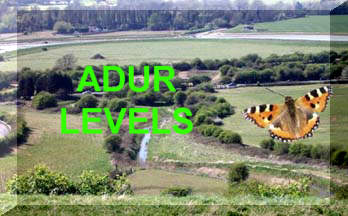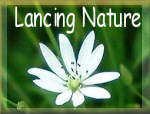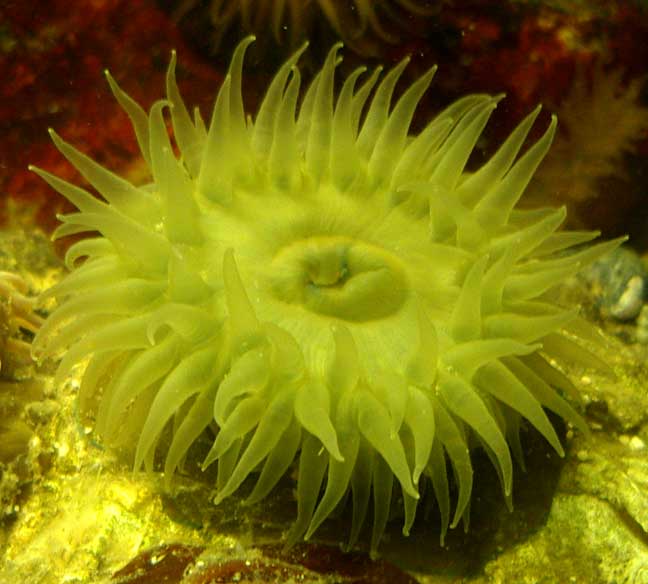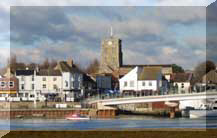 |
| Coastal Fringe |
| Chalk Downs: Mill Hill |
| Intertidal (Seashore) |
| River Adur Estuary |
| River Adur Flood Plain |
| Sea (off Sussex) |
| Town & Gardens |
| Widewater Lagoon |
| Lancing Ring (Nature) |
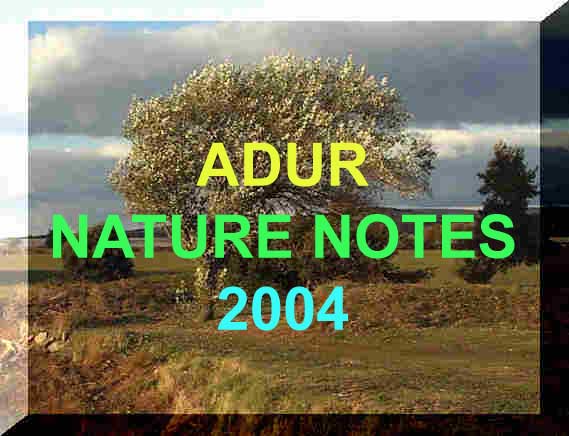 |
| SUSSEX LINKS |
| Findon Village |
| Rye Harbour Nature Reserve |
| Sussex
Archaeology &
Folklore |
| Lancing (RH) |
|
|
 |
|
|
 |
Looking
down the bridleway from Stonechat Junction (midway between Southwick Hill
and Mossy Bottom Barn) (TQ 225 078) towards
Slonk Hill
|
|
Southwick
Nature
Town &
Gardens, Sea & Seashore
2004
et seq.
including Shoreham
Harbour wildlife
Southwick Green
Link to the 2005 Reports31 December 2004
A large Peregrine Falcon was seen flying around Shoreham Harbour Power Station chimney (where the nest box is) at 10:00 am.Report by Peter Talbot-Elsden
29 November 2004
The half a dozen Turnstones on the strandline of Southwick beach at high tide were in in no hurry to fly away, relying on their camouflage.19 November 2004
A butterfly fluttered under the eaves of Southwick railway station. It was almost certainly a Red Admiral and it may turn out to be the last one of the year.3 November 2004
This mushroom was discovered underneath a tree on Southwick Green. It has not been positively identified yet. It is probably a species of Agaricus, or a closely related species, and it is likely to be edble.
Fungi of the Urban Adur Area in November 200413 August 2004
At least two, and probably many more, Migrant Hawkers, Aeshna mixta, flewover St. Michael's churchyard in Southwick. These impressive dragonflies crusied around, much too rapidly to photograph, at head height and above.
Adur Damselflies and Dragonflies11 July 2004
Shoreham Port Open Day
The Fish Festival display included a Triggerfish, Balistes capriscus, caught off Sussex the previous day, with a handful of other fish including Bass, two Stingrays, a Nursehound, Atlantic Eels, Corkwing Wrasse, Undulate Rays, one large Plaice and some invertebrate life with crustaceans that included Lobsters, Spiny Spider Crabs, Velvet Swimming Crabs, Common Hermit Crabs, Shore Crabs and molluscs including live Scallops.The Triggerfish (photographed above) swam around occasionally rising to the surface and expelling water from its mouth. It did not appear to be in discomfort and looked in a healthy condition.
At just after nine in the morning a single Peregrine Falcon flew around the Power Station Chimney. These hawks appear to be small at a distance. There were hundreds of Moon Jellyfish, Aurelia aurita, in the canal section of the harbour.
8 July 2004
Two Peregrine Falcons sparred over the top of the power station in Shoreham Harbour at 9:00 am on an overcast morning in a gap between the rain showers. They appeared from behind the chimney where the nest box faces south and chased each other over the main power station building landing on the roof between their spars.Report by Peter Talbot-Elsden (Southwick)
27 June 2004
Two young Peregrine Falcons were flying around the perches near their nest box on Shoreham Harbour Power station chimney. These were birds raised this year.Report by Peter Talbot-Elsden
17 June 2004These Nature Notes only occasionally feature bird photographs (more often because of the limitations of the photographic equipment than any other reason).
The Blue Tit in the image on the right was visiting a feeder in a Southwick garden. The picture was taken by Peter Baxter using a Pentax Digibino (digital camera with binoculars) and it is better than I can achieve using my digital camera. The photograph has been optimised (compressed), slightly cropped and reduced in size for this web page.31 May 2004
On Southwick beach a shrimp fisherman (push-netting) reported a juvenile Thornback Ray, Raja clavata, in his four foot net.
Adur Seashore
BMLSS Sharks and Rays
Beadlet Anemones, Actinia equina, in browns, reds and greens are found on the rocks and groynes on Southwick Beach 23 May 2004
The Peregrine Falcon on the nest box at Shoreham power station, flew inland over Shoreham at 1.00 pm.Report by W. Barber on Sussex Ornithological News
11 May 2004
A male Whinchat was singing in the fog from the Carrot's Cafe car park, by Shoreham Harbour Power Station (at Southwick) in the early morning rush hour.
1 May 2004
Three sleek birds of prey flew in under the mist on Southwick beach. These were a complete surprise and identified as immigrant Hobbies.Report by June Brown
21 April 2004
Minutes before sunset about 8:00 pm, in a most extraordinary display of over a thousand birds that flew over the downs above Highdown, Southwick, in a large black flock that swirled in an undulating chain over a mile long. It took two or three minutes for the birds to fly over in groups of about ten, each followed by a small gap at a height of about 25 metres (very rough estimate). These birds were larger than Starlings (although it was hard to judge their size) and without the white colour of seagulls. They did not fly frantically like Starlings but more sedately. The birds flew out to sea and disappeared.Report by Mike BurttAlthough they did not fly like Starlings, the idea of the huge flock feeding on the downs and then flying back to their roost on the West Pier, Brighton, seems the most likely explanation (in the absence of an alternative).
14 April 2004
Small White Butterflies and Small Tortoiseshell Butterflies fluttered on a sunny day with a blue sky and scarcely a wisp of cloud, the air temperature reached 19.1 ºC at 1:34 pm. These butterflies were in their ones and twos over the gardens, but were most noted down of the green open wharfage space at Fishersgate opposite Shoreham Harbour Power Station.
Broom on Shoreham Harbour bank at Fishersgate. Gorse also occurs. Seaweeds attached to the wharves, looking down from above In the enclosed canal the ripples on the surface of the shallows were caused by shoals of small juvenile Sand Smelt, Atherina presbyter, numbering over a hundred with a handful of slightly larger juvenile Grey Mullet, Chelon labrosus, as well. Even the largest of these fish were only 7 cm long and most were smaller than this.
The Japweed, Sargassum muticum, was seen again a a fouling organism attached to the wharfage. Scraping off the weeds periodically seems to made the situation worse as this foreign alga is a early invader on bare sites.
BMLSS AlgaeBroom and Gorse were on the steep bank where the footpath meanders down from Fishersgate to canalside. The Broom was only beginning to flower.
NB: Broom, Cytisus sp., the native one is Cytisus scoparius which flowers in May and June. Cytisus praecox is early flowering popular garden variety.NB by Ray Hamblett
30 March 2004
A Brimstone Butterfly flutters over Southwick Green (TQ 241053).Report by Sharon Penfold via Ray Hamblett onAdur Butterflies List 2004
the Adur Biodiversity Smart Group and the UK-Leps EForum
Adur Butterflies12 March 2004
As the rain tipped down in the early evening (before the light faded) the Peregrine Falcon, Falco peregrinus, was perched on one of the ledges on the Shoreham Harbour Power Station chimney for a few minutes,Report by Peter Talbot-Elsden (Southwick)Peregrines in Brighton
1 March 2004
The Peregrine Falcon has just landed on the Shoreham Harbour Power Station chimney, near the nest box, at 3:54 pm.Report by Peter Talbot-Elsden (Southwick)
27 February 2004
Eight Magpies were seen altogether on the wasteland which looks like it was formerly a large garden for the manor house in Church Street, a stone's throw over into Southwick in the thoroughfare leading to St. Michael's Church. Magpies are common enough birds in pairs and even three together, but eight birds, possibly four pairs, is unusual.10 February 2004
Whilst observing a gull* hanging in the air and finally settling on the undulating sea, a Sandwich Tern flew arrow-like a purposely over the shallow sea (at high tide) parallel with Southwick beach before disappearing out of view to the west. Terns are unusual in the winter months. (* I am not sure about the identity of this gull: it was probably a Black-headed Gull with prominent markings.)3 February 2004
After the gales of the last few days, I walked the strandline on Southwick Beach in a temperature of 15.1° C but there was nothing remotely exceptional apart from a single dead and washed up Auk. However, in the winter months the offshore passage of Guillemots and Razorbills is high so an occasional washed up casualty is to be expected. Whelk egg balls were present and it would be surprising if they weren't andsome were probably blown even further inland. Dead shells include the usual Slipper Limpets, Mussels, Venerids, Oysters, Scallops with the occasional Limpet and Cuttlebone.
BMLSS Molluscs
Oyster & the Slipper Limpet
BMLSS Beachcombing
BMLSS Sea Birds
Local Wildlife Links (SE England)
Adur Valley
Adur Butterfly Page
Adur Nature Notes 2004
Adur Valley Wildlife
Chalk Rivers Biodiversity (JNCC)
Cornwall (Geomorphology, Eclipse etc.)
Dungeness, Kent, England
Findon Village
Lancing & Sompting
Orford Ness: Coastal Ecology of a Shingle Bank (excellent references)
Ralph Hollins Nature Pages (Chichester Harbour area)
Rye Harbour Nature Reserve
Rockpooling Page
Seashore Page
Shingle Coast (Coastal Fringe of Shoreham Beach)
Shoreham-by-Sea Wildlife Page
South Downs Way (by Allen Pollard)
Southwick
Sussex Archaeology & Folklore
|
|
|
|
|
